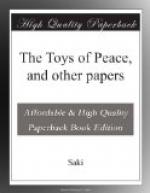Alethia Debchance sat in a corner of an otherwise empty railway carriage, more or less at ease as regarded body, but in some trepidation as to mind. She had embarked on a social adventure of no little magnitude as compared with the accustomed seclusion and stagnation of her past life. At the age of twenty-eight she could look back on nothing more eventful than the daily round of her existence in her aunt’s house at Webblehinton, a hamlet four and a half miles distant from a country town and about a quarter of a century removed from modern times. Their neighbours had been elderly and few, not much given to social intercourse, but helpful or politely sympathetic in times of illness. Newspapers of the ordinary kind were a rarity; those that Alethia saw regularly were devoted exclusively either to religion or to poultry, and the world of politics was to her an unheeded unexplored region. Her ideas on life in general had been acquired through the medium of popular respectable novel-writers, and modified or emphasised by such knowledge as her aunt, the vicar, and her aunt’s housekeeper had put at her disposal. And now, in her twenty-ninth year, her aunt’s death had left her, well provided for as regards income, but somewhat isolated in the matter of kith and kin and human companionship. She had some cousins who were on terms of friendly, though infrequent, correspondence with her, but as they lived permanently in Ceylon, a locality about which she knew little, beyond the assurance contained in the missionary hymn that the human element there was vile, they were not of much immediate use to her. Other cousins she also possessed, more distant as regards relationship, but not quite so geographically remote, seeing that they lived somewhere in the Midlands. She could hardly remember ever having met them, but once or twice in the course of the last three or four years they had expressed a polite wish that she should pay them a visit; they had probably not been unduly depressed by the fact that her aunt’s failing health had prevented her from accepting their invitation. The note of condolence that had arrived on the occasion of her aunt’s death had included a vague hope that Alethia would find time in the near future to spend a few days with her cousins, and after much deliberation and many hesitations she had written to propose herself as a guest for a definite date some week ahead. The family, she reflected with relief, was not a large one; the two daughters were married and away, there was only old Mrs. Bludward and her son Robert at home. Mrs. Bludward was something of an invalid, and Robert was a young man who had been at Oxford and was going into Parliament. Further than that Alethia’s information did not go; her imagination, founded on her extensive knowledge of the people one met in novels, had to supply the gaps. The mother was not difficult to place; she would either be an ultra-amiable old lady, bearing her feeble health




